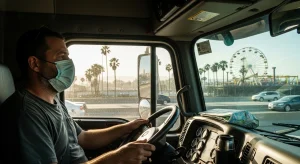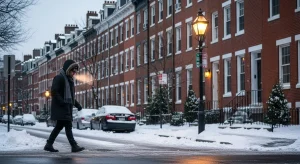ConsumerAffairs revealed both the cities with the worst congestion and those with the lightest traffic.
Traffic is one of the most serious problems in the United States. Daily commutes between home and work have become so tedious that, in recent years, they’ve led to a significant increase in road rage incidents. While this situation affects many cities across the country, some stand out as especially problematic.
ConsumerAffairs analyzed various data points, such as average commute times, daily hours spent in traffic, and fatal traffic accident rates, across the 50 most populated metropolitan areas in the U.S., in order to determine which cities suffer from the worst traffic.
The study revealed that cities with the worst congestion often align with those that have intense economic activity. According to the findings, the cities with the worst traffic in the United States are:

Cities with the worst traffic in the U.S.
1. Washington, D.C.
This year, Washington, D.C., overtook Los Angeles as the city with the worst traffic in the country. The ConsumerAffairs analysis shows the following average traffic times in the nation’s capital:
- Average daily commute time: 33.4 minutes
- Average weekday congestion duration: 6 hours, 35 minutes
- Annual rate of fatal traffic accidents: 5.95 per 100,000 residents
The total average weekday congestion time is equivalent to spending 71 full days per year in traffic, the second-highest total among the cities studied.
2. Los Angeles, California
Los Angeles ranks second overall, yet it remains the city with the highest number of weekday traffic jams, equating to 85 full days per year stuck in traffic, according to ConsumerAffairs.
- Average daily commute time: 30.5 minutes
- Average weekday congestion duration: 7 hours, 51 minutes
- Annual rate of fatal traffic accidents: 7.33 per 100,000 residents
3. Miami, Florida
In 2024, Miami ranked 12th on the list, but this year it jumped to third place, with an estimated 70 full days per year lost to traffic congestion. The metrics show:
- Average daily commute time: 29.2 minutes
- Average weekday congestion duration: 6 hours, 31 minutes
- Annual rate of fatal traffic accidents: 11.40 per 100,000 residents

4. San Francisco, California
Another California city makes the top five. For the second year in a row, San Francisco has the second-longest average daily commute among all cities analyzed. Its metrics include:
- Average daily commute time: 32.1 minutes
- Average weekday congestion duration: 5 hours, 31 minutes
- Annual rate of fatal traffic accidents: 5.24 per 100,000 residents
5. Atlanta, Georgia
Atlanta also ranks among the top five cities with the worst traffic, with an average daily commute of over 31 minutes.
- Average daily commute time: 31.3 minutes
- Average weekday congestion duration: 4 hours, 57 minutes
- Annual rate of fatal traffic accidents: 10.75 per 100,000 residents
The rest of the cities rounding out the top 10 worst for traffic and congestion in the United States, according to ConsumerAffairs, are:
6. New York, New York
7. Houston, Texas
8. Seattle, Washington
9. Baltimore, Maryland
10. San Jose, California

Cities with the least traffic in the United States
Not everything is negative across this vast country. Just as there are cities with high congestion levels, there are others where traffic is lower, or at least more manageable. The ConsumerAffairs analysis also highlights the cities with the lightest traffic in the U.S., with Rochester, New York, taking the top spot. With an average commute time of just over 21 minutes, the shortest among all cities analyzed.
The 10 cities with the lowest traffic levels are:
- Rochester, New York
- Salt Lake City, Utah
- Cleveland, Ohio
- Hartford, Connecticut
- St. Louis, Missouri
- Milwaukee, Wisconsin
- Columbus, Ohio
- Fresno, California
- Kansas City, Missouri
- Buffalo, New York
Geographically, the cities ranked worst for traffic are clustered in two main regions: three are located in the South, and the remaining two are in California. In contrast, cities with lower traffic congestion are mostly found in the northern part of the country. The full report on traffic and congestion is available on the ConsumerAffairs website.

The Wildest Truck Modifications on the Road Today
Truck customization has become a serious industry, with some builds rivaling high-end RV conversions in complexity and cost. From redesigned sleepers to upgraded suspension systems, these modifications do more than change appearance — they alter weight, electrical load, and the technical profile of the truck.

The most dangerous states in the U.S. during winter weather
While winter conditions are hazardous across the country, some states experience significantly higher accident rates during this season. A study by Samsara, a safety and

Winter storm disruptions lead to FMCSA HOS relief in 40 states
Motor carriers and drivers providing direct assistance in relief efforts in the affected states are covered by a hours-of-service (HOS) exemption. Over the weekend, a

Air Quality Alert in California Impacts Transportation
An air quality alert has been issued as high levels of fine particle pollution (PM2.5) trigger health warnings across several parts of California. The situation is affecting visibility, driver health, and logistics operations, forcing transportation professionals to take extra precautions on highways and in urban corridors

Winter Storm Survival on the Road: What Truck Drivers and Fleet Operators Need to Know Now
Winter storm with snow, ice, and extreme cold are creating dangerous highway conditions across multiple states, forcing truckers to make critical safety decisions before turning the key.

Miles of love: stories of truckers and their four-legged co-pilots
The love between truckers and their pets is a strong bond, and these stories will surely warm your soul. Love manifests itself in many ways,
